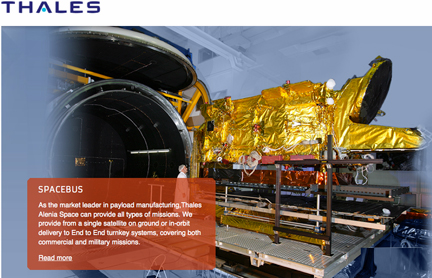
[SatNews] Thales Alenia Space has signed a contract with the European Space Agency (ESA) covering phase B in the development of ESA's new-generation platform for geostationary satellites, via the Neosat program.
The 18.2 million euros contract, within the scope of the Artes 14 program, was awarded jointly to Thales Alenia Space and Airbus Defense and Space, with Thales Alenia Space as mandataire. The complete project was allocated a 259 million euros budget during the ESA ministerial-level conference in November 2012, after being selected as one of the flagship programs in France's Future Investment Plan in 2011.
Within the scope of this program, Thales Alenia Space is developing a new-generation telecommunications satellite platform that will replace its current Spacebus product line with one that is lighter, more powerful and more competitive. It is expected to improve competitiveness by about 30 percent, and will enable the company to better match current and upcoming market needs, as well as its customers' evolving requirements. Because of its modular design, this new-generation platform will also mark an industrial breakthrough, by significantly shortening the production and integration timetables. The design will be optimized for all-electric propulsion, but will also support the use of chemical propulsion systems if needed.
Jean Loïc Galle, President and CEO of Thales Alenia Space, said, "This project is vital for Thales Alenia Space; it should help us increase our market share in an environment characterized by unprecedented competitive pressure. We will be mobilizing all of our forces throughout Thales Alenia Space to meet the performance and competitiveness objectives under very tight deadlines, since we are aiming to include this new platform in our offer by the end of 2015."
Thales Alenia Space's new platform will also meet its competitiveness and performance goals through the use of major technological breakthroughs, including:
- A new thermal control concept.
- New, lighter-weight structural materials.
- Very high power electrical thrusters
- New-generation batteries and solar cells
Nearly all Thales Alenia Space plants in France and Belgium and Italy, will be working on this project. Furthermore, with the UK Space Agency very involved in this program, In addition Thales Alenia Space has already set up a subsidiary structure in UK Britain which will contribute to the design and production of the propulsion subsystem for the new platform.

